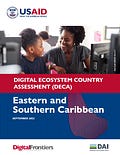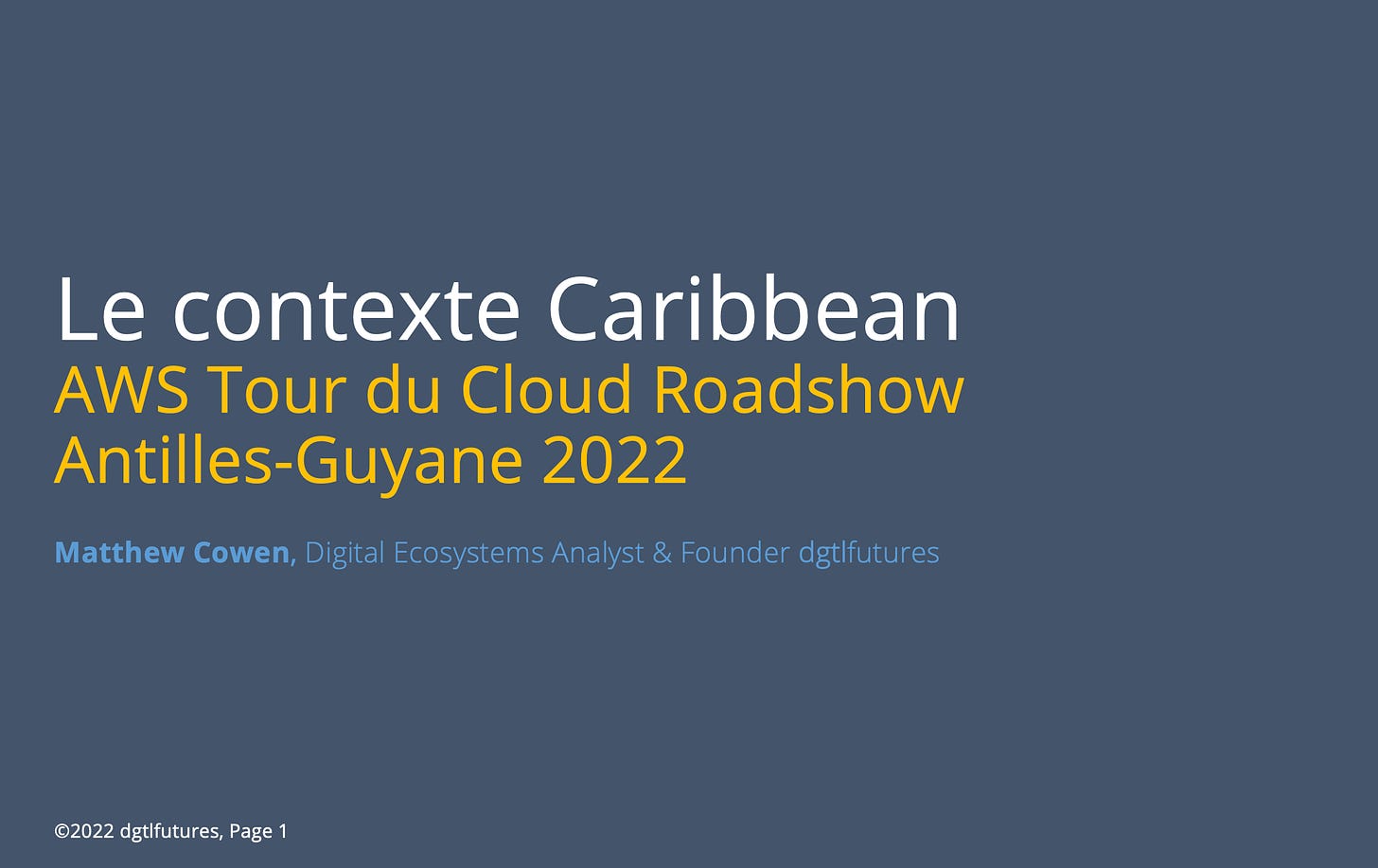Rather than whine about how I’ve been busy and haven’t had the time or resources to write too much for this newsletter, I thought I’d share a few of the things I’ve been doing so you can get up to speed. Forgive me for the shameless self-promotion.
I’m currently writing an article on tech regulation. I’m looking at it from a different angle that I think will be interesting. I’ll share it here as soon it is in a decent state.
Reports
Firstly, I co-authored a report for USAID Eastern and Southern Caribbean Mission, entitled “DIGITAL ECOSYSTEM COUNTRY ASSESSMENT (DECA) Eastern and Southern Caribbean”
It can be found here and is publicly available to anyone.
I’m immensely proud of the report I co-wrote with a wonderful team. We were 100% online and have still never met in person. Despite this challenge, I think we were all able to put together out some great work within the limitations of the context, but also the limitations a report like this naturally imposes.
We were able to pair it down to 121 pages (don’t be put off, it’s straightforward to read). In reality, we could have all produced around 120 pages each!
From the report, the main findings:
PILLAR 1: INFRASTRUCTURE AND ADOPTION
The broadband and mobile infrastructure for the region is generally good. While networks have appeared to stand up to increased utilization during the shift to online work and school, the COVID-19 pandemic exposed gaps in access to and affordability of the internet. Leveraging universal service funds, testing last-mile technologies, and exploring innovative policy approaches to increase competition could help make mobile data and internet access more inclusive and affordable. Coordinated action across the region may reduce vulnerability among excluded communities and foster online education, training, and work opportunities.
PILLAR 2: DIGITAL SOCIETY, RIGHTS, AND GOVERNMENT
With emerging activities rolling out under CARICOM’s Single ICT Space initiative and digital transformation projects across the region, development actors including USAID can support and coordinate complementary activities. For example, the cybersecurity action plan developed by the CARICOM Implementation Agency for Crime and Security (IMPACS) can strengthen the institutions and systems needed to support digital transformation efforts. With digital identity initiatives, data privacy concerns and misinformation starting to arise in the region, civil society and media play an increasingly important role in fostering institutional accountability. Supporting civil society and media to engage on emerging issues could foster robust and safe engagement for citizens, as digital transformation progresses.
PILLAR 3: DIGITAL ECONOMY
The region boasts some of the first adopters of central bank digital currencies and efforts to utilize new digital financial service technologies. While there have been recent set-backs, particularly with the Organization of Eastern Caribbean States (OECS) DCash pilot, efforts to responsibly pilot new FinTech solutions will inform the global community working to strengthen financial inclusion and resilience. The tech startup environment is steadily expanding. Startups are emerging in myriad sectors, yet entrepreneurs struggle to find investors comfortable with investing in technology solutions. Youth interested in tech have limited options in the formal education system to develop digital workforce skills. E-commerce offers a promising avenue for the region to connect to larger markets and foster innovation. Although the COVID-19 pandemic accelerated e-commerce uptake across the ESC, it continues to be hindered by suboptimal digital payment systems, and the absence of a region-wide strategy and supporting legislation.
I’d like to publicly thank Chelceé, Amy, Ariel, Samantha, Mansfield, and the teams at DAI and USAID that contributed.
I have continued work on the Trade Enhancement for the Eastern Caribbean (TEECA) project. I recently wrote a report on the state of Cybersecurity in the Caribbean and the opportunities in that field. The report is private, but I intend to write something here in the coming weeks.
For the same project, a couple of other reports providing guidance on the tools and services MSMEs can use to leverage cloud and automation have also been provided. Again, these are private, and I cannot share them. As these are pretty focused on the companies involved, I’m not sure I can add much value here in this format. However, if you would like to have some thoughts about those tools and how they can be leveraged, let me know in the comments, and I’ll see if there is enough demand.
I was asked to peer review an upcoming report, and I can say that it is an excellent start and something to look out for when it is out. I’ll let you know, but I can’t say more than that now.
The other big project I’ve been working on is taking shape, and I’d love to share more details about it in the coming weeks.
I’ve been working with a partner, and I think we’ve solved some problems with these reports. This information is so valuable to business that we’d like it to be available to anyone who needs it. That’s the first clue. Don’t ask for others. 😉
I nearly finished a paper on the travel and tourism industries’ potential use of web3 technologies but didn’t finish in time. As I was writing it, the space became very fluid, and the bottom dropped out of many of the (obvious) Ponzi schemes, making my analysis very difficult in such a fast-moving (and not in a good direction) environment.
I’m thinking of picking this up again and re-thinking through, now things have largely settled - or at least the big issues have calmed a little unless some billionaire shitposts something that stirs it all up again!
Podcasts
Since I last published, I have spoken on several episodes of the ICT Pulse Podcast. And today, the latest one is out, where I discuss the USAID report. Please go check it out.
For your convenience, here are all the episodes I’ve featured (latest on top):
ICTP 187: Artificial Intelligence, key emerging issues and opportunities, with Matthew Cowen
ICTP 181: Internet Exchange Points and the data scarcity challenge in the Caribbean region
ICTP 160: Understanding how technology perpetuates bias, with Matthew Cowen, of dgtlfutures.com
ICTP 080: Discovering Martinique, with Matthew Cowen of dgtlfutures
I also spoke on the excellent Innovation, Agilité & Excellence podcast with Jean-François Nantel and Éric L’Heureux. This is recorded in French along with my silly accent 🤗. Links here (latest on top):
Épisode 66: Échanges croisés sur la transformation numérique avec Matthew Cowen
Épisode 47: Web 3.0, IA et Blockchain avec Matthew Cowen
Épisode 13: La transformation numérique avec Matthew Cowen
Presentations
A while back, I had a chance to meet with Amazon Web Services in Martinique. We chatted, and I was asked to do a quick presentation on the context of the Caribbean and how it is essential for MSMEs that wish to undertake moves towards Cloud Computing.
I’m waiting to see if the video is available. As soon as I know of a link I’ll share it here.
In the meantime, if you’d like to get a copy of the presentation slides, I’d be happy to post them here with the main talking points annotated. I think the information is useful and quickly gives you an overview of the salient points.
The next presentation share is an older video of a presentation I made for the aforementioned TEECA project. I share the results of an Opportunity Study I wrote back in 2020/2021. Again, I think this is a good summary, and although some data has changed since then (mostly improved), it gives you a good idea of the market in the Eastern Caribbean.
YouTube link here. (French)
Other stuff
I teach Informatique and English (1st year) at Vatel Business School in Martinique. Vatel is an international hospitality management school, and it is a privilege to share some of my experience and knowledge with the bachelor’s students.




